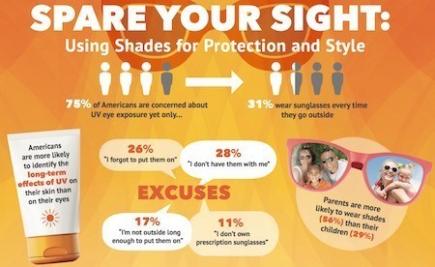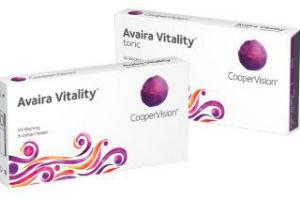UV protection has received increased attention over the past decades with both the CDC[1] and AOA[2] issuing statements stressing the importance of UV protection for skin and eyes, respectively. The risks of UV radiation are typically understood by medical professionals as are methods of minimizing UV exposure, however, a 2016 Vision Council report showed that consumers are not as well informed.[3] In fact, while three-quarters of Americans are concerned about potential eye problems from the sun’s UV rays, yet only 31 percent protect their eyes with sunglasses or other UV-protective eyewear every time they go outside (Figure 1). Additional findings from this report are that the majority of consumers do not use UV protective eyewear for many outdoor activities.
American adults are most likely to wear sunglasses while:
- Driving a vehicle (68.6 percent)
- Casually relaxing or spending time outdoors (55.2 percent)
- Near a body of water (49.1 percent)
- Watching a sporting event (33.7 percent)
- Playing a sport or exercising outdoors (29.5 percent)

Figure 1. Vision Council Report Findings.[4]
These findings suggest that the ECP has a role in proactively educating consumers about UV protection for their eyes. While contact lenses are not a replacement for other types of UV protection, they can have a complementary role with hats and sunglasses to maximize UV protection for wearers.[5] Studies have found that the added protection from UV blocking contact lenses is important even with the use of sunglasses, which may only provide partial protection – as UV light can ‘leak’ around the edges and cause damage.[6] In fact, the AOA recommends UV blocking sunglasses and suggests that UV blocking contact lenses may offer additional protection for contact lens wearers who do not wear “wrap-around” style sunglasses.2
While many of the contact lenses on the market provide UV protection, not all of them do. CooperVision is proud to offer UV blocking in our 1 day silicone hydrogel lens portfolio of clariti® and MyDay® 1 day contact lenses.
[2] https://www.aoa.org/patients-and-public/caring-for-your-vision/uv-protection/uv-protection-with-contact-lenses
[5] UV-absorbing contact lenses are NOT substitutes for protective UV-absorbing eyewear such as UV-absorbing goggles or sunglasses because they do not completely cover the eye and surrounding area. You should continue to use UV-absorbing eyewear as directed.
[6] Kwok LS, et. al. Ophthalmic Physiol Opt 2004;24(2):119-29.







